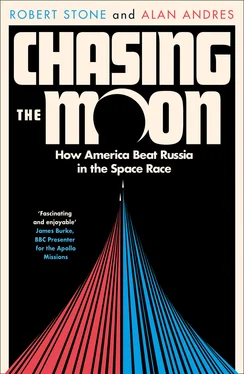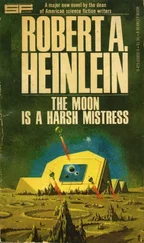A RINGING PHONE in the darkness immediately woke him. Arthur Clarke reached for his glasses and rose from the bed in his Barcelona hotel room to catch the call. The man’s voice on the other end of the line said he was calling from London. It was a journalist from the Fleet Street broadsheet the Daily Express, requesting a quotation in reaction to the breaking news. The reporter informed Clarke that minutes earlier the Soviet news agency, Tass, announced that Russia had successfully launched an artificial moon weighing 184 pounds into orbit around the Earth.
It was approaching midnight on October 4, 1957. Clarke was in Spain to attend that year’s International Astronautical Federation conference, and the call from London placed him in a privileged position among those who had arrived. Generalissimo Francisco Franco’s regime maintained an international news blackout; nothing appeared in newspapers or on the radio until it had been cleared for public release. Most of the other conference delegates remained ignorant of the Soviet Union’s triumph until those arriving late brought the news of the outside world with them. But within a few days everyone knew a new Russian word, “Sputnik,” meaning “fellow traveler.” The provocative response that Clarke gave to the reporter that night received attention in newspapers around the world as well: “As of Saturday the United States became a second-rate power.”
Clarke’s words did not sit well with William Davis, an American Air Force colonel. “I heard that and I didn’t like it! Space is the next major area of competition. If this one is lost, we might as well quit.” Colonel Davis suggested the United States should counteract the Soviet propaganda by readying its own space vehicle, with a human on board.
Missing from the Barcelona conference was Wernher von Braun. It was still Friday evening in Huntsville when a British journalist called his office at the Army Ballistic Missile Agency, the successor to the Ordnance Guided Missile Center. Von Braun had feared this day would come, and his sense of disappointment was mixed with anger. He had no doubt that had the United States government given him the opportunity, he would have placed the first artificial satellite in orbit.
At a press conference a few days later, President Eisenhower congratulated the Soviets but dismissed the idea of a race with Russia. He emphasized that both superpowers were engaged in an international program of scientific research. Eisenhower attempted to explain the Soviets’ success by casually noting that “the Russians captured all the German scientists at Peenemünde,” a remark that astounded many in Huntsville, as it was an outright lie. Unstated by Eisenhower was his relief that Russia had established the controversial precedent of orbital overflight. In the future, neither the Soviets nor other nations could voice their diplomatic objections when the United States eventually orbited its planned surveillance satellites.
The American media’s reaction to Sputnik was far less measured than the president’s. Columnists bemoaned the shocking loss of national prestige and criticized Eisenhower’s blasé reaction as lack of leadership. Opposition politicians appeared on television, expressing fear that the Soviets might use their powerful rockets to position a nuclear sword of Damocles above any nation.
Overshadowed by the news of Sputnik was another event at the Barcelona astronautical conference that captured the Cold War zeitgeist. Dr. S. Fred Singer, a young Austrian-born physicist noted for his work in cosmic radiation, was there to deliver a provocative paper. One of von Braun’s Project Orbiter colleagues and a leading member of the American Astronautical Society, Singer had also cultivated a talent for getting his name into print by fearlessly saying things his more prudent scientific colleagues would avoid.
Singer’s paper was titled “Interplanetary Ballistic Missiles: A New Astrophysical Research Tool” and argued in favor of exploding thermonuclear bombs on the Moon as a way to conduct scientific research. It was an idea that, he said, was “not only peaceful, but also useful, and, therefore, worthwhile.” This proposal, he believed, might lead to other experiments, such as exploding thermonuclear devices on the planets or an attempt to create a new star. But more immediately, Singer suggested, this initiative would promote world peace, as “the H-bomb race between the big powers would then be reduced to the much more tractable problem of seeing who could make the bigger crater on the Moon.” He was especially excited by the possibility of rearranging lunar geography. “The idea of creating a permanent crater as a mark of man’s work is an appealing one,” he said. “One is left with a nice crater on the Moon which is unnamed and therefore provides unique opportunities for perpetuating the names of presidents, prime ministers, and party secretaries.”
The Soviet delegates sitting in the lecture hall listened to Singer’s proposal with understandable astonishment and outrage. However, Singer later remarked that the Soviet reaction to his paper was “blown out of proportion.”
As Sputnik dominated the headlines, newspapers gave less attention to the big story out of Little Rock, Arkansas, where a week earlier President Eisenhower had ordered 1,200 members of the Army’s 101st Airborne Division to assist with the desegregation of Little Rock Central High School. The day before Eisenhower’s order to mobilize the troops, more than a thousand white protesters had rioted to prevent nine black students from attending the school. After Sputnik was launched, Radio Moscow seized upon an opportunity to shame the United States for hypocritically calling itself “the land of the free”: It alerted its global listeners to the exact moment when the satellite would pass over Little Rock, news that was specifically intended to be heard in the emerging independent nations of Africa.
Incensed that he and his new boss at Huntsville’s Army Ballistic Missile Agency, General John Medaris, hadn’t been given an opportunity to ready a modified Redstone rocket to launch a swift response to Sputnik, von Braun covertly made his case in the media, despite having received orders from Washington not to make any public comments. Magazine features called him “The Prophet of the Space Age” and “The Seer of Space,” portraying him as the brilliant visionary whose bold ideas had been ignored by petty bureaucrats, unimaginative military officials, and cowardly politicians. And knowing that nothing motivated people as powerfully as fear, von Braun evoked the specter of atomic annihilation, arguing that it was imperative that the United States establish its superiority in space if the nation was to survive.
Eisenhower became increasingly irritated by von Braun’s arrogance, celebrity status, and self-serving pronouncements. In fact, the president’s growing frustration with von Braun likely accounted for his wildly inaccurate comment at his press conference about the Russians having all the German scientists. If it had been intended to belittle von Braun’s reputation and public profile, it backfired badly.
The media panic only increased when in early November the Soviets orbited Sputnik 2. A much heavier satellite, it carried the first living creature on a one-way trip into orbit, the photogenic husky-terrier mix, Laika. NBC’s Merrill Mueller, a reporter who had covered D-Day, the Battle of the Bulge, and the bombing of Hiroshima, grimly faced the television camera as he told viewers, “The rocket that launched Sputnik 2 is capable of carrying a ton-and-a-half hydrogen-bomb warhead.”
Democrats with eyes on the 1960 elections, and possibly the White House, added their dire voices to the chorus of doom. Senator Henry “Scoop” Jackson announced that this was the last chance to save Western civilization from annihilation, while Senate majority leader Lyndon Johnson compared Sputnik to a cosmic Pearl Harbor, warning the nation that we “must go on a full, wartime mobilization schedule.”
Читать дальше












